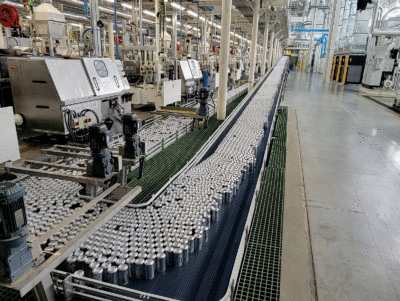By VERNON ROBISON
The Progress

On a hill at the far western end of the City of Mesquite, a sleepless giant is always quietly at work.
The mammoth new Crown Holdings manufacturing plant at the west end of Pioneer Blvd. has only been in operation for a few months now. And yet this remarkable facility has already churned out aluminum cans by the millions!
Plant manager Tony Rubick recently guided The Progress on a walk-through tour of Mesquite’s largest new manufacturer to give an idea of the enormous scale and productivity of this local facility.
Rubick transferred to Mesquite early last year from La Crosse, Wisconsin where he managed a similar facility for Crown. Since that time, he and his management team have assembled a crew of people from the ground up, all while overseeing the construction and outfitting of the 500,000 square foot manufacturing space.

Finding the 150 employees it takes to run the plant smoothly was a challenge in the small town of Mesquite and its remote surroundings. But Rubick said that they cast a wide recruiting net.
“We had a lot of local people apply and come aboard,” he said. “It was good to see that. But we also found that there are a lot of people from throughout the region who actually want to come to Mesquite and live here. So many people relocated here or they commute here to work.”
Of course, the Crown employment package offered by the company didn’t hurt in drawing employees to the facility. The company offers attractive wages and an excellent benefits package to its employees. Crown also provides its own full training programs to its workers so that they learn how to run the company’s trademark equipment.
“One of our top values as a company is to put people first,” Rubick said. “We place a tremendous emphasis on supporting the well-being of our employees and their families. We invest heavily in our people.”
The Mesquite plant relentlessly runs 24 hours a day, 7 days a week. It has a manufacturing capacity of 8 million cans per day when it is firing on all cylinders.
But Rubick explained that it has taken several months to ramp up production, train his crew of workers and straighten out all the kinks in the line. He said that the plant started running at around 600 cans per minute. Of course, to an inexperienced onlooker that seems like a lot of cans. But it was only the start.
By the end of November the plant had reached around 1,700 cans per minute- with only one of the facility’s two huge manufacturing lines in operation. The final goal is to achieve more than 5,000 cans per minute, Rubick said.
The process begins with rolls of aluminum coils weighing, on average, 23,500 lbs apiece. An uncoiler feeds the aluminum into a cupping press that forms it into cups, each measuring about 4 inches in diameter and an inch and a quarter deep. Each cupper can produce up to 5,200 cups per minute or modulate as needed to keep the production line supplied.
Each of these cups are the beginnings of an aluminum beverage can. They are all rushed into a lineup of machinery which take them through a journey called “Draw and Iron.” In this complex process, each cup is elongated and shaped into the size of a standard 12-oz. soda can.
Thousands of these cans are lined up and sped through a continuous process of refining. Along the way, they have substances applied that keep them smoothly moving down the line and prevent them snagging things up on the way.
The cans are subject to multiple cleanings with various grades of water, most of which is used, treated on site, and then reused again and again for conservation purposes.
There is a minutely precise process of trimming the open top of the can so that it can eventually be fitted with a lid. The lids aren’t installed here but will be attached later. They are especially manufactured by Crown at another facility. The lids are shipped separately to the final filling location where they are used to seal up the cans after they have been filled.
In the manufacturing process, a set of high-speed cameras take a photo of every single can as they rush by in a blur by the thousands. An automated system assesses each image and pinpoints any imperfections. If a can is determined to be below standard, it is quickly pulled out of line and dropped into a discard chute.
Each can is prepped with a chemical which gives an ultra-fine texture to its exterior. This texturing allows the label to be printed cleanly on the side of the can.
The cans are then affixed with the appropriate label for the product which, someday soon, will be poured inside. The design is done from printing plates that are prepared in a special center on site at the factory to the customers’ precise specifications.
The last manufacturing stop is at a large machine called the palletizer. This machine does a final sorting of the endless stream of cans, lines them all up precisely and then packs them in perfect flats of finished goods. The flats are carefully stacked, one on top of another, to form 9-foot-tall pallets.
Each pallet contains exactly 8,169 cans. The pallets are then picked up by a forklift and placed into storage.
More than two-thirds of the 500,000 sq ft facility is dedicated to warehouse space. The plant’s main storage area, which is adjacent to the manufacturing line, allows for 9,753 pallets to be stacked from floor to ceiling. That adds up to more than 79 million cans. But there is a larger auxiliary storage area just beyond that which has a capacity for 16,749 more pallets; a total of another 138 million cans.
The plant keeps these cans in the warehouse until the precise moment when they must be shipped to various Crown customer facilities around the country for use.
“We have a specific shipping dates and times when these have to be delivered so that they arrive at the moment they are needed by our customer to be filled on schedule,” Rubick said. “Each design is produced based on a customer forecast. The plant will produce and/or ship based on current inventories. The timing of these deliveries is established based on the filling locations’ production needs.”








![ElectionAd [Recovered]2](https://mvprogress.com/wp-content/uploads/2024/05/4-24-2024-FC-ElectionAd-Finalv3.jpg)


4 thoughts on “Local industry with a ‘can’-do attitude”
Excellent description of the process, Vernon. A combination of complex manufacturing processes and engineering expertise all to deliver a simple can, several billion a year, out of our tiny little town. Very impressive.
How amazing!! I knew the facility was there, but nothing else. Congratulations!!
I enjoyed reading Vernon Robison’s article about the Crown Holdings
Manufacturing plant in the 1/31/24 Edition in The PROGRESS!!
It’s a fascinating process right here in Mesquite, NV!!
Could you tell me if Mr. Robison knows if the Crown Holdings plant
gives tours to the public??! I’d be interested to see the
plant live and in action making up to 5000 cans per minute!!
Thank you!
Gary Nordbrock
Split Rail in Sun City
Very impressive facility! The total storage area available gives us an idea what future growth can be. Thank you for sharing Vernon. Good article